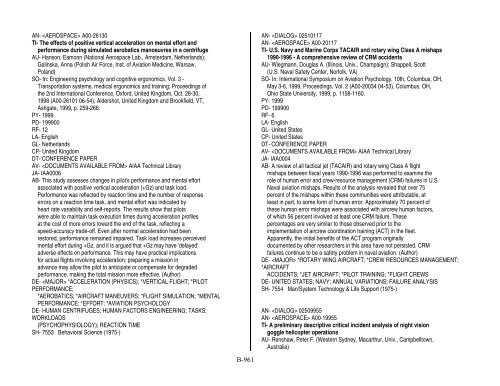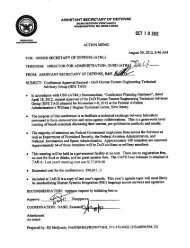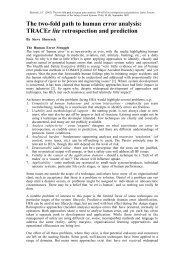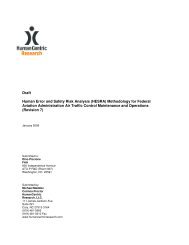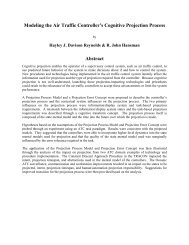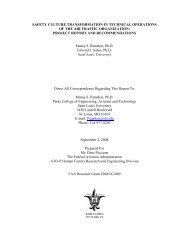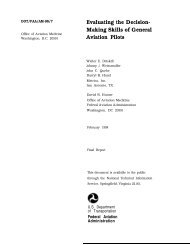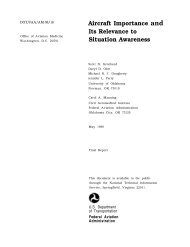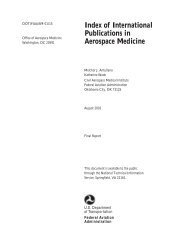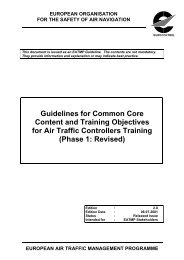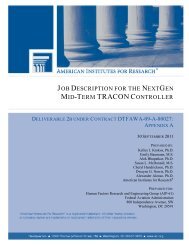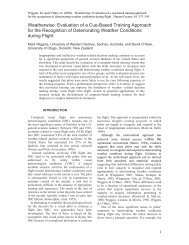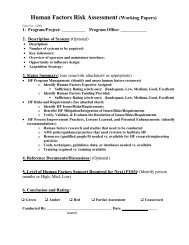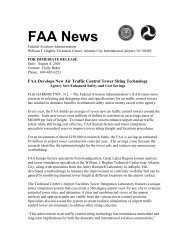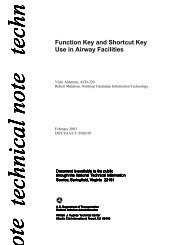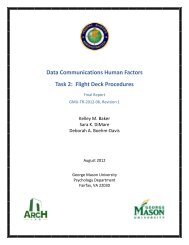- Page 1 and 2:
PsycINFO TY - JOUR ID - 2001-00614-
- Page 3 and 4:
workload and motion sickness during
- Page 5 and 6:
training, the Os' height from the g
- Page 7 and 8:
A1 - Johnson, David M. A1 - Stewart
- Page 9 and 10:
N2 - Investigated the relationship
- Page 11 and 12:
uniforms in a UH-60 helicopter simu
- Page 13 and 14:
design mysteries of hyper-complex o
- Page 15 and 16:
These were Royal Air Force and Turk
- Page 17 and 18:
N2 - Investigated the potential mea
- Page 19 and 20:
KW - Job Performance KW - Work Load
- Page 21 and 22:
A1 - Oser, Randall L. A1 - Prince,
- Page 23 and 24:
eserved) KW - Auditory Stimulation
- Page 25 and 26:
KW - Visual Perception PB - Academi
- Page 27 and 28:
modifier symbols, such as a nearby
- Page 29 and 30:
VL - 17 IS - 1 SP - 68-74 PB - Psyc
- Page 31 and 32:
(PsycINFO Database Record (c) 2000
- Page 33 and 34:
A1 - Martin, B. A1 - Harlay, F. Y1
- Page 35 and 36:
KW - Reaction Time KW - fatigue res
- Page 37 and 38:
AD - U Virginia TY - JOUR ID - 1978
- Page 39 and 40:
and sea-based operations, and some
- Page 41 and 42:
Science Citation PT J AU Mertens, H
- Page 43 and 44:
JI Aerosp. Am. PY 1996 PD JUN VL 34
- Page 45 and 46:
PT J AU STERN, JA BOYER, D SCHROEDE
- Page 47 and 48:
VL 62 IS 3 GA EZ171 J9 AVIAT SPACE
- Page 49 and 50:
AU MASON, RE HSIAO, TT TI WORKFORCE
- Page 51 and 52:
AU MERTENS, HW BOONE, JO TI FUNCTIO
- Page 53 and 54:
BP 47 EP 62 PG 16 JI Comput PY 1987
- Page 55 and 56:
PT J AU DARK, SJ TI MEDICALLY DISQU
- Page 57 and 58:
PT J AU VANDEVENTER, AD TI A FOLLOW
- Page 59 and 60:
PG 8 JI Aviat. Space Environ. Med.
- Page 61 and 62:
significantly differ from normal, w
- Page 63 and 64:
visual-scene background affected pi
- Page 65 and 66:
PT J AU Schroeder, JA Chung, WWY TI
- Page 67 and 68:
BP 35 EP 42 PG 8 JI IEEE Eng. Med.
- Page 69 and 70:
predictor was also evaluated; at th
- Page 71 and 72:
flying qualities, using maritime he
- Page 73 and 74:
WOODSON WE, 1992, HUMAN FACTORS DES
- Page 75 and 76:
AB Introduction: Night Vision Devic
- Page 77 and 78:
GOWER DW, 8925 USAARL KNAPP CJ, 199
- Page 79 and 80:
KENNEDY RS, 1996, HUMAN FACTORS SAF
- Page 81 and 82:
WARREN WH, 1988, NATURE, V336, P162
- Page 83 and 84:
MUSTARD BE, 1987, EXP BRAIN RES, V6
- Page 85 and 86:
J9 J AMER HELICOPTER SOC UT ISI:A19
- Page 87 and 88:
knowledge bases of tasks, to make t
- Page 89 and 90:
questions and studies, indicating t
- Page 91 and 92:
influence of two embedded training
- Page 93 and 94:
1988, ELASTIC WRINKLING SA, PS17 19
- Page 95 and 96:
WARWICK G, 1990, FLIGHT INT, V137,
- Page 97 and 98:
PD DEC VL 85 IS 12 GA KA952 J9 J RO
- Page 99 and 100:
SANDERS MG, 1976, AVIAT SPACE ENV M
- Page 101 and 102:
UT ISI:A1990EE34300003 PT J AU SCHR
- Page 103 and 104:
KRETSIS G, 1987, THESIS U LONDON EN
- Page 105 and 106:
NR 58 CR *N ATL TREAT ORG, 1972, AG
- Page 107 and 108:
EP 572 PG 8 JI Hum. Factors PY 1984
- Page 109 and 110:
the flight envelope boundaries with
- Page 111 and 112:
eliminating the huge losses associa
- Page 113 and 114:
novel scanning antenna, with resolu
- Page 115 and 116:
Langley plot method and by intercom
- Page 117 and 118:
A personal computer-based aviation
- Page 119 and 120:
Day/Night Advanced Pilotage System,
- Page 121 and 122:
Journal Long Form, 56, Ellerbrock,
- Page 123 and 124:
Journal Long Form, 66, Smeyne, Alan
- Page 125 and 126:
a manner similar to shape functions
- Page 127 and 128:
Journal Long Form, 84, Venkatesan,
- Page 129 and 130:
Military cockpits Air to ground tar
- Page 131 and 132:
Conference Proceeding, 100, Leacock
- Page 133 and 134:
helicopter as well as in a lower ra
- Page 135 and 136:
employed visual simulation technolo
- Page 137 and 138:
ehavior, goal-processing activities
- Page 139 and 140:
completely set up by user in advanc
- Page 141 and 142:
Geo/Cockpit Reference display produ
- Page 143 and 144:
Smart Structures and Materials 1996
- Page 145 and 146:
avoidance data using on-board measu
- Page 147 and 148:
helicopters. Subsequent flight test
- Page 149 and 150:
improvement had to come from the on
- Page 151 and 152:
Annual Forum. Part 1 (of 3), May 9-
- Page 153 and 154:
on various rotorcraft motion constr
- Page 155 and 156:
DLR realizes flight testing under t
- Page 157 and 158:
algorithms are presented. Visual ta
- Page 159 and 160:
stabilization, Synthetic Vision for
- Page 161 and 162:
wing aircraft where weight is of pa
- Page 163 and 164:
The reduction of the minimum altitu
- Page 165 and 166:
provided substantial improvements i
- Page 167 and 168:
Honeywell has conducted a series of
- Page 169 and 170:
analyzed using results which demons
- Page 171 and 172:
Journal Long Form, 32, Cagley, Jame
- Page 173 and 174:
STD-1553 serial bus. Real-time calc
- Page 175 and 176:
imagery at rates varying from five
- Page 177 and 178:
Fuzzy logic controllers Genetic alg
- Page 179 and 180:
Conference Proceeding, 73, Hansford
- Page 181 and 182:
Journal Long Form, 81, Wilkins, Rob
- Page 183 and 184:
A new flight research vehicle, the
- Page 185 and 186:
employing game theory. Recently, th
- Page 187 and 188:
Apr 26-30 1992, Las Vegas, NV, USA
- Page 189 and 190:
programming tapes for machines on t
- Page 191 and 192:
Proceedings, May 1991, Phoenix, AZ,
- Page 193 and 194:
discernible. The control response t
- Page 195 and 196:
control logic is designed to accomp
- Page 197 and 198:
advances in this field are also dis
- Page 199 and 200:
Conference Proceeding, 37, Stringer
- Page 201 and 202:
systems is the weight savings resul
- Page 203 and 204:
of two rows of three-abreast seatin
- Page 205 and 206:
In the main, operating companies of
- Page 207 and 208:
An experimental program, which comb
- Page 209 and 210:
Conference Proceeding, 30, Ganesan,
- Page 211 and 212:
Conference Proceeding, 41, Davis, T
- Page 213 and 214:
Conference Proceeding, 52, McCauley
- Page 215 and 216:
mode shapes, which are suitable for
- Page 217 and 218:
Society. St Louis, MO, USA, America
- Page 219 and 220:
Conference Proceeding, 124, Clark,
- Page 221 and 222:
SP - 5E5/1-9 vol.2 CY - Piscataway,
- Page 223 and 224:
small business innovative research
- Page 225 and 226:
standard personal ventilator. While
- Page 227 and 228:
JA - Sensor Data Fusion and Integra
- Page 229 and 230:
etween the first solo night and pri
- Page 231 and 232:
KW - system design KW - display inf
- Page 233 and 234:
ID - 6120812 T1 - Flight testing of
- Page 235 and 236:
Several new tests are included: an
- Page 237 and 238:
SN - 0277-786X AD - Anacapa Sci. In
- Page 239 and 240:
N1 - Enhanced and Synthetic Vision
- Page 241 and 242:
KW - hover task KW - fixed-based he
- Page 243 and 244:
KW - elevation KW - compensation st
- Page 245 and 246:
sizes and types will elicit varying
- Page 247 and 248:
SP - 95-9 vol.1 CY - Santa Monica,
- Page 249 and 250:
ased upon a relatively straightforw
- Page 251 and 252:
ID - 5609550 T1 - Rotorcraft safety
- Page 253 and 254:
N1 - Braunschweig, Germany N1 - 22-
- Page 255 and 256:
KW - overlap binocular field-of-vie
- Page 257 and 258:
A1 - Halmos, Z. Y1 - 1995 N1 - Helm
- Page 259 and 260:
N1 - vol.2 N1 - Nashville, TN, USA
- Page 261 and 262:
KW - optical density KW - optical f
- Page 263 and 264:
KW - context-sensitive advice KW -
- Page 265 and 266:
N1 - Proceedings of NAECON '93 - Na
- Page 267 and 268:
information processing capability t
- Page 269 and 270:
A1 - Ahmad, S. Y1 - Jan. 1994 N2 -
- Page 271 and 272:
viewing conditions in a rotorcraft
- Page 273 and 274:
KW - PC-based Crew Chief Station KW
- Page 275 and 276:
A1 - Rash, C. E. A1 - Stephens, R.
- Page 277 and 278:
KW - statistical analysis KW - flig
- Page 279 and 280:
AD - Westland Helicopters Ltd, Yeov
- Page 281 and 282:
judgments and long-term stereo expo
- Page 283 and 284:
T1 - Quantitative method for relati
- Page 285 and 286:
KW - safety KW - military aviation
- Page 287 and 288:
KW - Assistant Air Administrator KW
- Page 289 and 290:
KW - response time JA - Proceedings
- Page 291 and 292:
forward looking infra-red (FLIR) or
- Page 293 and 294:
N1 - Atlanta, GA, USA N1 - 15-17 Ju
- Page 295 and 296:
KW - computer-aided engineering KW
- Page 297 and 298:
factors) Y1 - June 1987 N2 - The im
- Page 299 and 300:
SN - 0852963351 AD - R. Aircraft Es
- Page 301 and 302:
KW - cognitively appropriate semant
- Page 303 and 304:
TY - CONF ID - 2112021 T1 - Airspee
- Page 305 and 306:
CY - New York, NY, USA PB - IEEE AD
- Page 307 and 308:
KW - DSAL JA - IEEE PLANS 80. Posit
- Page 309 and 310:
KW - operational helicopter aviatio
- Page 311 and 312:
N2 - A fixed-base helicopter simula
- Page 313 and 314:
fourth-order system, it is applicab
- Page 315 and 316:
CS- Lawrence Erlbaum Associates, In
- Page 317 and 318:
TRANSPORT AIRCRAFT HUMAN FACTORS IN
- Page 319 and 320:
Manufacturing Process and Control T
- Page 321 and 322:
AB- This report presents 4 studies.
- Page 323 and 324:
SF- MRIS M RN- CG-D-14-90 R&DC 08/9
- Page 325 and 326:
ELECTROMAGNETIC INTERFERENCE STORMS
- Page 327 and 328:
DE- HELICOPTERS PILOTS (PERSONNEL)
- Page 329 and 330:
year of operation. The helicopter c
- Page 331 and 332:
CS- Systems Control Technology, Inc
- Page 333 and 334:
AU- Treiterer, J PY- 1972 LA- Engli
- Page 335 and 336:
PY- 1973 LA- English SF- HRIS H PG-
- Page 337 and 338:
SHOWN BY THE FACT THAT THE PERCENTA
- Page 339 and 340:
AU- Hess, RA PY- 1977 LA- English S
- Page 341 and 342:
PD- 19761000 AU- Clarke, MJ Osborne
- Page 343 and 344:
AIRCRAFT ROAD CONSTRUCTION PUBLIC T
- Page 345 and 346:
AZ- 2189882 AA- ADA385583/XAB TI-
- Page 347 and 348:
TI- Technical rept AU- Berner, W.
- Page 349 and 350:
CS- 117341000; 436297 RN- MTI20.97
- Page 351 and 352:
order to develop tailored intervent
- Page 353 and 354:
encompassed all Class A accidents i
- Page 355 and 356:
SH- 92A (Behavior and Society--Job
- Page 357 and 358:
Characteristics of the CEP have bee
- Page 359 and 360:
LA- English PC- PC A05/MF A01 JA- G
- Page 361 and 362:
the mission planning process for th
- Page 363 and 364:
AZ- 2116725 AA- N19990009997/XAB T
- Page 365 and 366:
was a container express box (CONEX)
- Page 367 and 368:
NT- Order this product from NTIS by
- Page 369 and 370:
the similarity between two scan pat
- Page 371 and 372:
SH- 51C (Aeronautics and Aerodynami
- Page 373 and 374:
allowable seat stroking distances (
- Page 375 and 376:
CS- 114856001; 434430 RN- AFRL-HE-
- Page 377 and 378:
PG- 73p NT- Product reproduced from
- Page 379 and 380:
DE- *Spatial distribution; *Visual
- Page 381 and 382:
AB- Helmet mounted displays (HMDs)
- Page 383 and 384:
from HFI applications on a non-majo
- Page 385 and 386:
CP- United States AB- A systematic
- Page 387 and 388:
phone at 1-800-553-NTIS (U.S. custo
- Page 389 and 390:
helicopter back pain. Based on this
- Page 391 and 392:
helicopter simulator. Sixteen non-U
- Page 393 and 394:
PY- Mar 97 PG- 50-250 citations NT-
- Page 395 and 396:
AA- AD-B095 681/3 TI- Data Present
- Page 397 and 398:
CS- 008124000; 234450 RN- ARO/FRI/
- Page 399 and 400:
AZ- 1980700 AA- AD-A313 889/8 TI-
- Page 401 and 402:
AZ- 1972361 AA- N96-27964/1 TI- Fl
- Page 403 and 404:
engineering; Commuter aircraft; Cyb
- Page 405 and 406:
RN- TR-1313-1; WL-TR-96-3028 CN- F3
- Page 407 and 408:
(Military Sciences--General); 92A (
- Page 409 and 410:
Springfield, VA, 22161, USA. LA- En
- Page 411 and 412:
SH- 79G (Ordnance--Guns) AZ- 193953
- Page 413 and 414:
Flight Crew Perceptions CS- Bioneti
- Page 415 and 416:
PY- 1 Sep 95 PG- 38p NT- Order this
- Page 417 and 418:
AA- AD-A298 780/8 TI- Video Method
- Page 419 and 420:
DE- *Laser target designators; *Pro
- Page 421 and 422:
Certification of Advanced Aviation
- Page 423 and 424:
PY- cJan 95 PG- 10p NT- In AGARD, L
- Page 425 and 426:
PY- Dec 94 PG- 54p NT- Order this p
- Page 427 and 428:
LA- English DT- Journal article PC-
- Page 429 and 430:
Technology and Human Factors Engine
- Page 431 and 432:
PY- Nov 94 PG- 35p NT- Order this p
- Page 433 and 434:
eferred to as the Two-Step Method (
- Page 435 and 436:
AA- AD-A285 654/0 TI- Laboratory a
- Page 437 and 438:
structural loads. (orig.). (Copyrig
- Page 439 and 440:
SH- 51C (Aeronautics and Aerodynami
- Page 441 and 442:
its basic stability augmentation sy
- Page 443 and 444:
flight operations. Both research ef
- Page 445 and 446:
environmental and electromagnetic i
- Page 447 and 448:
agreed that despite the limitations
- Page 449 and 450:
AZ- 1802115 AA- AD-A277 668/0 TI-
- Page 451 and 452:
AA- AD-A275 887/8 TI- Vision Impai
- Page 453 and 454:
AU- Blair, J. CS- SCIENTECH, Inc.,
- Page 455 and 456:
e given to parking clearance criter
- Page 457 and 458:
NT- Order this product from NTIS by
- Page 459 and 460:
principles relate to the use and fu
- Page 461 and 462:
AZ- 1771155 AA- N94-13310/5 TI- Im
- Page 463 and 464:
AU- Green, D. L. ; Hart, J. ; Hwosc
- Page 465 and 466:
PC- PC A04/MF A01 JA- GRAI9324 CP-
- Page 467 and 468:
LA- English PC- (Order as N93-30673
- Page 469 and 470:
AB- Established in 1981, the Center
- Page 471 and 472:
AU- McAnulty, D. M. ; Ruffner, J. W
- Page 473 and 474:
PC- PC A04/MF A01 JA- GRAI9315 CP-
- Page 475 and 476:
CP- United Kingdom AB- The ominous
- Page 477 and 478:
PG- 20p NT- Previously Announced in
- Page 479 and 480:
evacuation; Temperature; Signs and
- Page 481 and 482:
Monitor, Model 506 TI- Final rept
- Page 483 and 484:
TI- Evaluation of Night Vision Gogg
- Page 485 and 486:
AZ- 1691627 AA- AD-A256 245/2 TI-
- Page 487 and 488:
SH- 51C (Aeronautics and Aerodynami
- Page 489 and 490:
Executive) in the United Kingdom. T
- Page 491 and 492:
evaluation, aeromedical equipment.
- Page 493 and 494:
Methane; Monitoring; Remote Sensing
- Page 495 and 496:
JA- GRAI9223; STAR3020 CP- United S
- Page 497 and 498:
available. Success in automating NO
- Page 499 and 500:
AA- AD-A251 077/4 TI- Test and Eva
- Page 501 and 502:
customers); (703)605-6000 (other co
- Page 503 and 504:
de Vision Nocturne) Held in Pensaco
- Page 505 and 506:
Operations. The tests were conducte
- Page 507 and 508:
Lateral range curves and sweep widt
- Page 509 and 510:
airframe spin data is unavailable h
- Page 511 and 512:
AZ- 1616136 AA- DE91018195 TI- Rad
- Page 513 and 514:
CP- United Kingdom AB- The United K
- Page 515 and 516:
The procedures were: ear-canal meas
- Page 517 and 518:
PG- 3p NT- In NASA, Washington, 4TH
- Page 519 and 520:
CS- 090678000; SP- Sypher:Mueller
- Page 521 and 522:
; Vision; Comfort; Flight clothing;
- Page 523 and 524:
helmet-mounted display. The experim
- Page 525 and 526:
Information und Dokumentation. CS-
- Page 527 and 528:
DE- Aeronautics; Altitude; Army res
- Page 529 and 530:
their helicopters. Upon selection o
- Page 531 and 532:
analysis procedures. DE- *Atropine;
- Page 533 and 534:
The data presented will include qua
- Page 535 and 536:
SH- 95G (Biomedical Technology and
- Page 537 and 538:
DT- Conference proceeding PC- PC A0
- Page 539 and 540:
simultaneously improving the signal
- Page 541 and 542:
CS- Construction Engineering Resear
- Page 543 and 544:
engine and transmission data at all
- Page 545 and 546:
CS- Advisory Group for Aerospace Re
- Page 547 and 548:
satisfies these requirements and in
- Page 549 and 550:
performance ID- *Foreign technology
- Page 551 and 552:
PG- 445p NT- Product reproduced fro
- Page 553 and 554:
LA- English DT- Conference proceedi
- Page 555 and 556:
SH- 51C (Aeronautics and Aerodynami
- Page 557 and 558:
to military standards by the U.S. A
- Page 559 and 560:
AH1FWS to deficiencies in the visua
- Page 561 and 562:
AZ- 1469342 AA- PB90-850959 TI- Mi
- Page 563 and 564:
to provide near compatible solution
- Page 565 and 566:
AA- PB89-867261 TI- Head Up Displa
- Page 567 and 568:
and feasibility study was performed
- Page 569 and 570:
AZ- 1434792 AA- N89-17579/8 TI- Ti
- Page 571 and 572:
clothing; Thermal properties ID- *F
- Page 573 and 574:
technique, in terms of learned cont
- Page 575 and 576:
augmentation; Workloads (Psychophys
- Page 577 and 578:
PG- 57p NT- In German, With 12 refs
- Page 579 and 580:
CP- United States AB- There has bee
- Page 581 and 582:
CN- N00014-84-C-2442 PY- 1 Oct 88 P
- Page 583 and 584:
vehicle. Evaluations of the integra
- Page 585 and 586:
(Electrotechnology--Optoelectronic
- Page 587 and 588:
performed maximal voluntary exertio
- Page 589 and 590:
AZ- 1362979 AA- N88-16653/3 TI- In
- Page 591 and 592:
PC- PC A25/MF A01 JA- GRAI8812; STA
- Page 593 and 594:
ID- NTISNASA SH- 51F (Aeronautics a
- Page 595 and 596:
Questionnaires; Rates; Recognition;
- Page 597 and 598:
y sideslip, and some effective dihe
- Page 599 and 600:
JA- GRAI8721; STAR2519 CP- United S
- Page 601 and 602:
CS- 019045001; NC473657 RN- NAS 1.
- Page 603 and 604:
DE- *Spinal column; *Posture(Physio
- Page 605 and 606:
for point sources and from 1 to 200
- Page 607 and 608:
AA- N87-14304/6 TI- Emergency Exit
- Page 609 and 610:
Cockpits; Day; Dynamics; Flight; Hi
- Page 611 and 612:
affected by helicopter vibration. D
- Page 613 and 614:
for the analysis of pilot workload
- Page 615 and 616:
factors engineering; *Man machine s
- Page 617 and 618:
CP- United States AB- This paper di
- Page 619 and 620:
email at orders@ntis.fedworld.gov.
- Page 621 and 622:
aircraft; Lightweight; Management;
- Page 623 and 624:
Road, Springfield, VA, 22161, USA.
- Page 625 and 626:
AB- Thirteen subanalyses were perfo
- Page 627 and 628:
Directly related functions included
- Page 629 and 630:
integrated avionics system with the
- Page 631 and 632:
AA- N85-25237/7 TI- Rotorcraft Dig
- Page 633 and 634:
Road, Springfield, VA, 22161, USA.
- Page 635 and 636:
AB- No abstract available. DE- *Coc
- Page 637 and 638:
control, which encompasses the area
- Page 639 and 640:
Pollution and Control) AZ- 1146347
- Page 641 and 642:
Road, Springfield, VA, 22161, USA.
- Page 643 and 644:
JA- GRAI8423; STAR2219 CP- United S
- Page 645 and 646:
AB- The operational, technical, and
- Page 647 and 648:
AU- Chaffin, W. ; Hiott, B. F. ; Kn
- Page 649 and 650:
for helicopters engaged in low-leve
- Page 651 and 652:
CP- United States AB- The U.S. Navy
- Page 653 and 654:
AA- AD-P002 708/6 TI- Army Helicop
- Page 655 and 656:
PG- 25p NT- In Dutch; English Summa
- Page 657 and 658:
and Propellants--Jet and Gas Turbin
- Page 659 and 660:
customers); (703)605-6000 (other co
- Page 661 and 662:
AZ- 1057954 AA- AD-P001 626/1 TI-
- Page 663 and 664:
Road, Springfield, VA, 22161, USA.
- Page 665 and 666:
email at orders@ntis.fedworld.gov.
- Page 667 and 668:
engineering, Flight control systems
- Page 669 and 670:
1-800-553-NTIS (U.S. customers); (7
- Page 671 and 672:
ID- Color display systems; F-16 air
- Page 673 and 674:
SP- National Aeronautics and Space
- Page 675 and 676:
customers); (703)605-6000 (other co
- Page 677 and 678:
addressed. DE- *Aeronautical engine
- Page 679 and 680:
SH- 51C (Aeronautics and Aerodynami
- Page 681 and 682:
ID- Nap of the Earth; JUH-1H aircra
- Page 683 and 684:
CS- 026909000; 404578 RN- USAARL-8
- Page 685 and 686:
SH- 51B (Aeronautics and Aerodynami
- Page 687 and 688:
email at orders@ntis.fedworld.gov.
- Page 689 and 690:
TI- Final Report AU- Rue, R. J. ;
- Page 691 and 692:
Aerodynamics--Avionics) AZ- 0972179
- Page 693 and 694:
email at orders@ntis.fedworld.gov.
- Page 695 and 696:
LA- English PC- MF A01 JA- GRAI8219
- Page 697 and 698:
aviation operations is presented. T
- Page 699 and 700:
NT- Workshop Held at Palo Alto, Cal
- Page 701 and 702:
TI- Airworthiness and Flight Charac
- Page 703 and 704:
CS- Aeronautical Research Labs., Me
- Page 705 and 706:
of 1978-1979 (Anderson and Jahnsen,
- Page 707 and 708:
DE- *Cockpits; *Display systems; In
- Page 709 and 710:
Field intensity; Electric fields; P
- Page 711 and 712:
of conventional electrical cable (s
- Page 713 and 714:
; *Nasa programs; *Policies; *Resea
- Page 715 and 716:
UH-60A. Early in the UTTAS conceptu
- Page 717 and 718:
the frequency range of 40 to 1000 H
- Page 719 and 720:
NT- Order this product from NTIS by
- Page 721 and 722:
*Aviation safety; NATO; Low tempera
- Page 723 and 724:
LA- English PC- PC A02/MF A01 JA- G
- Page 725 and 726:
email at orders@ntis.fedworld.gov.
- Page 727 and 728:
CS- Army Aeromedical Research Lab.,
- Page 729 and 730:
PG- 48p NT- See also Volume 9, AD-A
- Page 731 and 732:
AZ- 0854718 AA- AD-A089 191/1/XAB
- Page 733 and 734:
his vision by special displays so a
- Page 735 and 736:
Springfield, VA. NT- Order this pro
- Page 737 and 738:
long-term technologies into an adva
- Page 739 and 740:
PY- 24 Mar 80 PG- 16p NT- Trans. of
- Page 741 and 742:
PY- Feb 80 PG- 55p NT- Order this p
- Page 743 and 744:
presents the facts, conditions, cir
- Page 745 and 746:
AU- Robertson, D. G. CS- Department
- Page 747 and 748:
email at orders@ntis.fedworld.gov.
- Page 749 and 750:
AZ- 0792294 AA- N79-32834/0/XAB TI
- Page 751 and 752:
email at orders@ntis.fedworld.gov.
- Page 753 and 754:
attention inside the cockpit. (Auth
- Page 755 and 756:
NT- Order this product from NTIS by
- Page 757 and 758:
Flight crews; Fatigue; Human factor
- Page 759 and 760:
discussions. The data collected ind
- Page 761 and 762:
(Communication--Verbal) AZ- 0734790
- Page 763 and 764:
accuracy of theoretical flow field
- Page 765 and 766:
RN- USAARL-SPECIAL BIB-SER-9-SUP-1
- Page 767 and 768:
AB- The results of test programs co
- Page 769 and 770:
Charge/Detonation System; Dice Thro
- Page 771 and 772:
sensors, a cooling generator, and a
- Page 773 and 774:
at (703)321-8547; and email at orde
- Page 775 and 776:
customers); (703)605-6000 (other co
- Page 777 and 778:
information content was entirely de
- Page 779 and 780:
CN- NONR414800 PY- Feb 65 PG- 64p N
- Page 781 and 782:
toxicology evaluation are continuin
- Page 783 and 784:
customers); (703)605-6000 (other co
- Page 785 and 786:
NT- Distribution limitation now rem
- Page 787 and 788:
is more effective than either of th
- Page 789 and 790:
PC- PC A06/MF A01 JA- GRAI7710 AB-
- Page 791 and 792:
countries); fax at (703)321-8547; a
- Page 793 and 794:
AB- The objective of the program is
- Page 795 and 796:
Requirements, Analysis of R and D T
- Page 797 and 798:
Road, Springfield, VA, 22161, USA.
- Page 799 and 800:
at various wind azimuths were inves
- Page 801 and 802:
NT- See also Study 2, AD-A007 812.
- Page 803 and 804:
AZ- 0588820 AA- AD-A032 028/3/XAB
- Page 805 and 806:
CS- Army Scientific Advisory Panel
- Page 807 and 808:
SH- 51B (Aeronautics and Aerodynami
- Page 809 and 810:
AZ- 0577573 AA- AD-871 350/5/XAB T
- Page 811 and 812:
NT- Distribution limitation now rem
- Page 813 and 814:
PY- Nov 70 PG- 190p NT- Distributio
- Page 815 and 816:
email at orders@ntis.fedworld.gov.
- Page 817 and 818:
customers); (703)605-6000 (other co
- Page 819 and 820:
(Ordnance--Guns) AZ- 0570727 AA- A
- Page 821 and 822:
AZ- 0569991 AA- AD-923 214/1/XAB T
- Page 823 and 824:
AB- The expanded service test of th
- Page 825 and 826:
Calibration ID- *Uh-1n aircraft; Ca
- Page 827 and 828:
CS- 332500 CN- DAHC19-71-C-0021; S
- Page 829 and 830:
AZ- 0567498 AA- AD-881 186/1/XAB T
- Page 831 and 832:
SH- 68B (Environmental Pollution an
- Page 833 and 834:
email at orders@ntis.fedworld.gov.
- Page 835 and 836:
controlling the airspeed of a helic
- Page 837 and 838:
Considerations TI- Final rept. 30
- Page 839 and 840:
from flight test data. The programs
- Page 841 and 842:
supplies, and sample transcripts of
- Page 843 and 844:
DE- *Microphones; *Noise reduction;
- Page 845 and 846:
NT- Order this product from NTIS by
- Page 847 and 848:
CS- Army Materiel Command Texarkana
- Page 849 and 850:
assigning the crews for the field t
- Page 851 and 852:
tracking, parachutes, balloon telem
- Page 853 and 854:
oute structure in the New York area
- Page 855 and 856:
SH- 74E (Military Sciences--Logisti
- Page 857 and 858:
during April and June 1973. (Author
- Page 859 and 860:
AZ- 0456286 AA- N74-27504/1/XAB TI
- Page 861 and 862:
the criteria values. (Author) DE- *
- Page 863 and 864:
claims. Most all the projects on wa
- Page 865 and 866:
PC- PC A07/MF A01 JA- GRAI7408 AB-
- Page 867 and 868:
AB- The report describes POBAL, a t
- Page 869 and 870:
JA- GRAI7319 AB- A higher harmonic
- Page 871 and 872:
AB- Three experiments designed to d
- Page 873 and 874:
AA- AD-751 217/XAB TI- High Perfor
- Page 875 and 876:
SH- 92B (Behavior and Society--Psyc
- Page 877 and 878:
DE- *Pilots; *Visual perception; *H
- Page 879 and 880:
AZ- 0297921 AA- AD-733 671/XAB TI-
- Page 881 and 882:
of VTOL aircraft and helicopters. A
- Page 883 and 884:
Development--Emergency Services and
- Page 885 and 886:
ID- C-142 aircraft; Gust alleviatio
- Page 887 and 888:
Road, Springfield, VA, 22161, USA.
- Page 889 and 890:
conducted at Edwards Air Force Base
- Page 891 and 892:
PY- 1969 PG- 135p NT- Proceedings o
- Page 893 and 894:
Road, Springfield, VA, 22161, USA.
- Page 895 and 896:
helicopter and second the effect th
- Page 897 and 898:
AZ- 0190814 AA- AD-691 299/XAB TI-
- Page 899 and 900:
AZ- 0182500 AA- N69-21707/XAB TI-
- Page 901 and 902:
CS- 142925 RN- TR-1-214-VOL-1; HS-
- Page 903 and 904:
PY- Feb 68 PG- 30p NT- Order this p
- Page 905 and 906:
multivariable vehicular control sys
- Page 907 and 908:
Tandem Rotor Helicopter. Volume I.
- Page 909 and 910: ecommendation that no tinted media
- Page 911 and 912: TI- Technical rept CS- Aviation Sa
- Page 913 and 914: schemes, applied to the main rotor
- Page 915 and 916: Road, Springfield, VA, 22161, USA.
- Page 917 and 918: situation. (Author) DE- *Aviation p
- Page 919 and 920: RN- JANAIR-TR-D228-100-011 CN- NONR
- Page 921 and 922: een completed. From the information
- Page 923 and 924: TI- State of the ART for V/STOL Con
- Page 925 and 926: fixed-wind flyable system and two r
- Page 927 and 928: AA- AD-602 125/XAB TI- Helicopter
- Page 929 and 930: tunnel models; Model tests; Take-of
- Page 931 and 932: support, and internal situational a
- Page 933 and 934: including NVG and HMD are offered w
- Page 935 and 936: AN- 02559555 AN- A01-17563 TI- Fi
- Page 937 and 938: SH- 7554 Man/System Technology & Li
- Page 939 and 940: TI- Evaluation of algorithms for fu
- Page 941 and 942: AN- 02535822 AN- A00-46831 TI- Ca
- Page 943 and 944: TI- Evaluation of a motion fidelity
- Page 945 and 946: REFUELING; PERSONAL COMPUTERS; ALGO
- Page 947 and 948: PD- 199900 RF- 18 LA- English GL- G
- Page 949 and 950: technology is currently available t
- Page 951 and 952: situation is always unique and ther
- Page 953 and 954: total rate of 0.22 accidents per 10
- Page 955 and 956: least one environmental test. Ninet
- Page 957 and 958: order to recommend improvements in
- Page 959: Operations by Enhanced Training AU-
- Page 963 and 964: GL- United States CP- United States
- Page 965 and 966: AN- A99-40429 TI- Helmet-mounted d
- Page 967 and 968: were analyzed using frequency domai
- Page 969 and 970: missions. The development, integrat
- Page 971 and 972: involving heavy machinery (e.g., mu
- Page 973 and 974: PD- 199900 LA- English GL- United S
- Page 975 and 976: The increasingly important topic of
- Page 977 and 978: RN- NASA no. 19990025678 LA- Englis
- Page 979 and 980: RN- NASA no. 19980218991 LA- Englis
- Page 981 and 982: communication system. Sixteen air t
- Page 983 and 984: A stepwise multiple regression foun
- Page 985 and 986: partial restoration of recordings b
- Page 987 and 988: DE- HUMAN FACTORS ENGINEERING; IN-F
- Page 989 and 990: own recollections and involvement i
- Page 991 and 992: displays in lieu of miniaturized CR
- Page 993 and 994: SH- 7581 Administration & Managemen
- Page 995 and 996: AN- 02347126 AN- A98-27588 TI- An
- Page 997 and 998: licence of the MiG-15 jet fighter a
- Page 999 and 1000: Alexandria, VA, American Helicopter
- Page 1001 and 1002: increase at the high rates typical
- Page 1003 and 1004: LA- English GL- United States CP- U
- Page 1005 and 1006: DE- WORKLOADS (PSYCHOPHYSIOLOGY); A
- Page 1007 and 1008: the ANR system on, and, with and wi
- Page 1009 and 1010: JA- STAR9701 AB- Rotorcraft-pilot c
- Page 1011 and 1012:
AN- 02315521 AN- A97-41062 TI- An
- Page 1013 and 1014:
GL- United States CP- United States
- Page 1015 and 1016:
DE- HARDWARE; PERFORMANCE TESTS; FL
- Page 1017 and 1018:
GL- United States CP- United States
- Page 1019 and 1020:
weaknesses relative to the harness
- Page 1021 and 1022:
AN- 02292483 AN- N97-10549 TI- Vi
- Page 1023 and 1024:
AV- CASI HC A03/MF A04 JA- STAR961
- Page 1025 and 1026:
manufacturers, research institution
- Page 1027 and 1028:
SH- 7503 Air Transportation & Safet
- Page 1029 and 1030:
AB- There is a need for calibrated
- Page 1031 and 1032:
helicopters of different weight (li
- Page 1033 and 1034:
JA- IAA9612 AB- Indonesian Air Forc
- Page 1035 and 1036:
AN- 02259646 AN- A96-44927 TI- De
- Page 1037 and 1038:
SO- In: Laser radar technology and
- Page 1039 and 1040:
favorable alternative to the 'norma
- Page 1041 and 1042:
CP- United States DT- CONFERENCE PR
- Page 1043 and 1044:
instrumented Cobra helicopter. The
- Page 1045 and 1046:
LA- English GL- United States CP- U
- Page 1047 and 1048:
participated. Using a UH-60 flight
- Page 1049 and 1050:
TRACKING; *MARINE METEOROLOGY; *MET
- Page 1051 and 1052:
various size and gender aircrew usi
- Page 1053 and 1054:
etween flight performance with and
- Page 1055 and 1056:
PD- 199300 RF- 10 CN- NAG2-308 LA-
- Page 1057 and 1058:
SH- 7508 Aircraft Stability & Contr
- Page 1059 and 1060:
JAS 39 cockpit display system, impr
- Page 1061 and 1062:
SO- In: AHS, Annual Forum, 51st, Fo
- Page 1063 and 1064:
AB- The technical approach for the
- Page 1065 and 1066:
instrumentation system was designed
- Page 1067 and 1068:
SH- 7554 Man/System Technology & Li
- Page 1069 and 1070:
esults are presented in this paper.
- Page 1071 and 1072:
AU- MULDER, J. A. (Technische Univ.
- Page 1073 and 1074:
AU- Cadogan, David P.; Jackson, Lis
- Page 1075 and 1076:
AN- A95-22480 TI- Helicopter noise
- Page 1077 and 1078:
SO- In: AHS, Annual Forum, 50th, Wa
- Page 1079 and 1080:
SH- 7554 Man/System Technology & Li
- Page 1081 and 1082:
DE- *FLIGHT OPERATIONS; *FLIGHT SA
- Page 1083 and 1084:
DT- CONFERENCE PAPER AV- AIAA Tech
- Page 1085 and 1086:
involved a delay of rise times afte
- Page 1087 and 1088:
DE- *AIRCRAFT PILOTS; *HELICOPTERS
- Page 1089 and 1090:
intermittently. Instructions in Exp
- Page 1091 and 1092:
SO- In: AHS, Annual Forum, 49th, Sa
- Page 1093 and 1094:
AN- 02128051 AN- A94-19165 TI- Ev
- Page 1095 and 1096:
PD- 199300 RF- 6 LA- English GL- Un
- Page 1097 and 1098:
TI- Flight tests of the digitally c
- Page 1099 and 1100:
CP- United States DT- REPORT AV- A
- Page 1101 and 1102:
Furthermore, we will focus on the s
- Page 1103 and 1104:
measures experimental design. The r
- Page 1105 and 1106:
AN- 02101511 AN- N93-15016 TI- Tr
- Page 1107 and 1108:
INTENSITY; *NOISE REDUCTION DE- AER
- Page 1109 and 1110:
to simulating motion effects on sin
- Page 1111 and 1112:
AN- 02077830 AN- A93-37878 TI- Di
- Page 1113 and 1114:
AB- Tests conducted on a variety of
- Page 1115 and 1116:
SH- 7506 Aircraft Instrumentation (
- Page 1117 and 1118:
AU- VOLODKO, A. M.; VERKHOZIN, M. P
- Page 1119 and 1120:
professional'nuiu nadezhnost' letch
- Page 1121 and 1122:
ecent sea trials are examined. (Aut
- Page 1123 and 1124:
GL- United States CP- United States
- Page 1125 and 1126:
AN- 02032965 AN- N92-17165 TI- Sy
- Page 1127 and 1128:
AN- 02027444 AN- N92-11629 TI- Pe
- Page 1129 and 1130:
FLIGHT; *VISUAL SIGNALS DE- FLIGHT
- Page 1131 and 1132:
that a steep 'trans-cockpit authori
- Page 1133 and 1134:
DE- *BEARING (DIRECTION); *HELICOP
- Page 1135 and 1136:
autogiro are described. The work wa
- Page 1137 and 1138:
AV- AIAA Technical Library JA- IAA
- Page 1139 and 1140:
AN- 01984386 AN- A92-16050 TI- Fl
- Page 1141 and 1142:
and convenient means of acquiring t
- Page 1143 and 1144:
AV- AIAA Technical Library JA- IAA
- Page 1145 and 1146:
DE- *ANTHROPOMETRY; *HELICOPTER PE
- Page 1147 and 1148:
AN- N91-29730 TI- Performance of s
- Page 1149 and 1150:
a contact lens. Up-to-date results
- Page 1151 and 1152:
trainability of aspirant pilots to
- Page 1153 and 1154:
Subsequent changes in cockpit WBGT
- Page 1155 and 1156:
PY- 1990 PD- 199010 RF- 11 RN- SAE
- Page 1157 and 1158:
AN- 01929682 AN- A91-31295 TI- NA
- Page 1159 and 1160:
SN- 0360-5450 LA- English GL- Germa
- Page 1161 and 1162:
TESTS; FRACTURE MECHANICS; HUMAN FA
- Page 1163 and 1164:
DE- *AH-64 HELICOPTER; *AVIONICS;
- Page 1165 and 1166:
RN- AIAA PAPER 90-3172 LA- English
- Page 1167 and 1168:
SH- 1C Aircraft SH- 7508 Aircraft
- Page 1169 and 1170:
NT- Prepared in cooperation with Fe
- Page 1171 and 1172:
Symbology Tutor, consists of an int
- Page 1173 and 1174:
SN- 0091-3286 LA- English GL- Unite
- Page 1175 and 1176:
AN- 01877767 AN- A90-42495 TI- He
- Page 1177 and 1178:
HELICOPTER TAIL ROTORS; HIGH STRENG
- Page 1179 and 1180:
attention. The different assumption
- Page 1181 and 1182:
SH- 7506 Aircraft Instrumentation (
- Page 1183 and 1184:
DE- *CONTROL SYSTEMS DESIGN; *FLIG
- Page 1185 and 1186:
AN- 01863439 AN- A90-28167 TI- HA
- Page 1187 and 1188:
CP- United States DT- CONFERENCE PA
- Page 1189 and 1190:
AN- 01854825 AN- A90-19553 TI- Si
- Page 1191 and 1192:
approach, a control aid program ope
- Page 1193 and 1194:
SH- 7503 Air Transportation & Safet
- Page 1195 and 1196:
SO- IN: AIAA Flight Simulation Tech
- Page 1197 and 1198:
of modern military helicopters are
- Page 1199 and 1200:
analyzed for content, agencies invo
- Page 1201 and 1202:
DT- PREPRINT AV- AIAA Technical Li
- Page 1203 and 1204:
tilt-rotor aircraft, as derived fro
- Page 1205 and 1206:
ecently implemented OH-6A helicopte
- Page 1207 and 1208:
LA- English GL- United States CP- U
- Page 1209 and 1210:
AU- FITZPATRICK, DANIEL T. (Hawaii,
- Page 1211 and 1212:
DT- REPORT AV- AIAA Technical Libr
- Page 1213 and 1214:
AB- The National Transportation Saf
- Page 1215 and 1216:
AN- A88-53659 TI- Determination of
- Page 1217 and 1218:
*NAVIGATION INSTRUMENTS; *VIDEO EQU
- Page 1219 and 1220:
PD- 198700 RF- 23 LA- English GL- U
- Page 1221 and 1222:
JA- IAA8817 AB- One- and two-person
- Page 1223 and 1224:
SH- 7503 Air Transportation & Safet
- Page 1225 and 1226:
development of turbines, ramjet eng
- Page 1227 and 1228:
(STAR) aircraft. The STAR, a one-of
- Page 1229 and 1230:
AU- PELEGRIN, MARC J. (ONERA, Centr
- Page 1231 and 1232:
DE- ATTITUDE CONTROL; CONTROL SIMUL
- Page 1233 and 1234:
NT- Colloquium held in Brunswick, W
- Page 1235 and 1236:
DT- REPORT AV- AIAA Technical Libr
- Page 1237 and 1238:
AB- The prevalence of backache amon
- Page 1239 and 1240:
AB- Helicopter pilots were used to
- Page 1241 and 1242:
sizes and distances in the visual s
- Page 1243 and 1244:
*FLIGHT TESTS; *MANUAL CONTROL; *ME
- Page 1245 and 1246:
SF- DTIC DE- *ANTIEMETICS AND ANTI
- Page 1247 and 1248:
DE- *CONFERENCES; *FLIGHT SIMULATI
- Page 1249 and 1250:
GL- United Kingdom CP- Germany DT-
- Page 1251 and 1252:
SH- 7554 Man/System Technology & Li
- Page 1253 and 1254:
SH- 7505 Aircraft Design, Testing &
- Page 1255 and 1256:
DT- CONFERENCE PAPER AV- AIAA Tech
- Page 1257 and 1258:
JA- IAA8713 AB- A topographic map a
- Page 1259 and 1260:
personnel and, in the long run, in
- Page 1261 and 1262:
AN- 01636068 AN- A87-19255 TI- Fl
- Page 1263 and 1264:
systems. An important feature of th
- Page 1265 and 1266:
PD- 198500 RF- 287 LA- Russian GL-
- Page 1267 and 1268:
DE- CONTROL STABILITY; FEEDBACK CON
- Page 1269 and 1270:
GL- Germany CP- Germany DT- CONFERE
- Page 1271 and 1272:
TI- The T800 turbine engine solicit
- Page 1273 and 1274:
variation in scene content and text
- Page 1275 and 1276:
TI- Helicopter flight control with
- Page 1277 and 1278:
Black Hawk. The program phases incl
- Page 1279 and 1280:
LA- English GL- Australia CP- Unite
- Page 1281 and 1282:
AN- 01602456 AN- A86-26004 TI- AI
- Page 1283 and 1284:
AN- 01600170 AN- A86-23718 TI- Re
- Page 1285 and 1286:
flight, and a requirement for the p
- Page 1287 and 1288:
DT- CONFERENCE PAPER AV- AIAA Tech
- Page 1289 and 1290:
AN- 01590810 AN- A86-14356 TI- Th
- Page 1291 and 1292:
GL- Germany CP- International Organ
- Page 1293 and 1294:
SH- 7599 General (1975-) AN- 01570
- Page 1295 and 1296:
AU- COYLE, S. CS- Aerospace Enginee
- Page 1297 and 1298:
SH- 5H Man-machine Relations SH- 7
- Page 1299 and 1300:
PERFORMANCE; *TASKS DE- FEEDBACK CO
- Page 1301 and 1302:
DE- NOISE MEASUREMENT; NOISE PREDIC
- Page 1303 and 1304:
against the stressors found in all
- Page 1305 and 1306:
DE- AIRFRAMES; FLIGHT TESTS; HIGH S
- Page 1307 and 1308:
and test procedures; a battery of 1
- Page 1309 and 1310:
AU- EYRAUD, M. Y.; BOROWSKY, M. S.
- Page 1311 and 1312:
pilot eyes-down time, and 100 perce
- Page 1313 and 1314:
AV- AIAA Technical Library JA- IAA
- Page 1315 and 1316:
of the Fourteenth Annual Symposium,
- Page 1317 and 1318:
GL- United States CP- United States
- Page 1319 and 1320:
DE- *AIRCRAFT DESIGN; *AVIONICS; *
- Page 1321 and 1322:
access the results data base on-lin
- Page 1323 and 1324:
DE- AIRLINE OPERATIONS; ALTITUDE SI
- Page 1325 and 1326:
control augmentation system (SCAS),
- Page 1327 and 1328:
AU- LAVASSAR, L. J. SO- Cockpit (IS
- Page 1329 and 1330:
eplaceable assembly (WRA) which, ut
- Page 1331 and 1332:
TI- Backache in Chetak crew and sug
- Page 1333 and 1334:
CP- France DT- PREPRINT AV- AIAA T
- Page 1335 and 1336:
symbols superimposed upon terrain-b
- Page 1337 and 1338:
CP- United States DT- CONFERENCE PA
- Page 1339 and 1340:
SH- 7501 Aeronautics--General (1975
- Page 1341 and 1342:
CS- LB799994 PY- 1982 PD- 198210 N
- Page 1343 and 1344:
AN- 01431976 AN- N83-13059 TI- Ae
- Page 1345 and 1346:
LA- English GL- U.S.S.R. CP- United
- Page 1347 and 1348:
DE- *AIRCRAFT INSTRUMENTS; *DATA A
- Page 1349 and 1350:
considered include: (1) separation
- Page 1351 and 1352:
HORIZONTAL FLIGHT; PHYSIOLOGICAL FA
- Page 1353 and 1354:
model or is the new model to be pro
- Page 1355 and 1356:
CS- Centre d'Etudes et de Recherche
- Page 1357 and 1358:
efficient and cost effective data t
- Page 1359 and 1360:
HELICOPTERS SH- 7504 Aircraft Commu
- Page 1361 and 1362:
RF- 44 LA- French GL- France CP- Fr
- Page 1363 and 1364:
of instrumentation, palm rests were
- Page 1365 and 1366:
LA- Russian CP- U.S.S.R. DT- JOURNA
- Page 1367 and 1368:
commercial and military aircraft fr
- Page 1369 and 1370:
AN- A82-43755 TI- Laser Doppler an
- Page 1371 and 1372:
Helicopter Society, 1982, p. 43-54.
- Page 1373 and 1374:
an NOE route with significantly mor
- Page 1375 and 1376:
Germany, September 16-19, 1980, Rep
- Page 1377 and 1378:
y insurance and depreciation, while
- Page 1379 and 1380:
RF- 1 NT- In AGARD Aural Commun. in
- Page 1381 and 1382:
addressed. (R.C.T.) SF- NASA CASI D
- Page 1383 and 1384:
AU- KRUEGER, G. P.; ARMSTRONG, R. N
- Page 1385 and 1386:
RN- AD-A089794; ER-15047; USAAVRADC
- Page 1387 and 1388:
CP- International Organization DT-
- Page 1389 and 1390:
AV- AIAA Technical Library AV- NT
- Page 1391 and 1392:
American Helicopter Society, 1981,
- Page 1393 and 1394:
LA- English GL- France CP- United S
- Page 1395 and 1396:
DT- CONFERENCE PAPER AV- AIAA Tech
- Page 1397 and 1398:
DE- *CONTROLLABILITY; *FLIGHT CONT
- Page 1399 and 1400:
JA- IAA8116 AB- The optimal control
- Page 1401 and 1402:
CP- Netherlands DT- ANALYTIC OF COL
- Page 1403 and 1404:
AB- The conference included papers
- Page 1405 and 1406:
experiments using a ground-based fl
- Page 1407 and 1408:
SH- 7553 Behavioral Science (1975-)
- Page 1409 and 1410:
JA- IAA8008 AB- This research was i
- Page 1411 and 1412:
AU- CHILDS, J. M. CS- Canyon Resear
- Page 1413 and 1414:
PY- 1978 PD- 197811 PG- 63P. CN- EY
- Page 1415 and 1416:
is installed; (4) the interior is n
- Page 1417 and 1418:
NT- In AGARD Operational Helicopter
- Page 1419 and 1420:
discussed. The present injury and f
- Page 1421 and 1422:
DT- CONFERENCE PAPER AV- AIAA Tech
- Page 1423 and 1424:
DE- *AIRCRAFT MANEUVERS; *AIRCRAFT
- Page 1425 and 1426:
called CUBITS to establish a single
- Page 1427 and 1428:
10-51) LA- English GL- United State
- Page 1429 and 1430:
and heading retention was installed
- Page 1431 and 1432:
AV- AIAA Technical Library AV- NT
- Page 1433 and 1434:
AV- AIAA Technical Library AV- NT
- Page 1435 and 1436:
handling tasks. Performance is meas
- Page 1437 and 1438:
SH- 7508 Aircraft Stability & Contr
- Page 1439 and 1440:
RF- 12 LA- German GL- Germany, Fede
- Page 1441 and 1442:
factors, all-weather capability, pa
- Page 1443 and 1444:
JA- IAA7905 AB- A human factors eva
- Page 1445 and 1446:
AU- KNIGHT, V. H., JR. (NASA, Langl
- Page 1447 and 1448:
SH- 7554 Man/System Technology & Li
- Page 1449 and 1450:
AV- NTIS HC A17/MF A01 JA- STAR782
- Page 1451 and 1452:
AN- N78-26055 TI- Flight performan
- Page 1453 and 1454:
DE- *AEROSPACE MEDICINE; *AIRCRAFT
- Page 1455 and 1456:
to control column deflection. Headq
- Page 1457 and 1458:
mecaniques AU- POIRIER, J. L.; BEAU
- Page 1459 and 1460:
AN- 00936713 AN- A78-36948 TI- A
- Page 1461 and 1462:
DE- *AIRCRAFT INSTRUMENTS; *BOEING
- Page 1463 and 1464:
AB- This paper proposes a design pr
- Page 1465 and 1466:
simulated AH-1 mission before and a
- Page 1467 and 1468:
LA- English GL- United States CP- U
- Page 1469 and 1470:
generating effectiveness data, and
- Page 1471 and 1472:
LA- English GL- United States CP- U
- Page 1473 and 1474:
AB- Aviators were required to fly a
- Page 1475 and 1476:
PD- 197509 PG- 30P. CN- DA PROJ. 3A
- Page 1477 and 1478:
audio, and oscillograph recording e
- Page 1479 and 1480:
(U.S. Army, Avionics Laboratory, Fo
- Page 1481 and 1482:
test. (G.R.) SF- AIAA DE- *AVIONIC
- Page 1483 and 1484:
voice-transmitted 'check caution pa
- Page 1485 and 1486:
148 p PY- 1975 PD- 197500 LA- Engli
- Page 1487 and 1488:
AN- 00791646 AN- A76-34165 TI- Cr
- Page 1489 and 1490:
vestibular sensory organs (semicirc
- Page 1491 and 1492:
TI- Research and development applic
- Page 1493 and 1494:
systems has shown that conventional
- Page 1495 and 1496:
SH- 7554 Man/System Technology & Li
- Page 1497 and 1498:
CP- International Organization DT-
- Page 1499 and 1500:
NT- In AGARD The Guidance and Contr
- Page 1501 and 1502:
TI- Proceedings of Conference on Ai
- Page 1503 and 1504:
It consists of a simple cross hair
- Page 1505 and 1506:
PG- 357P. NT- Transl. into ENGLISH
- Page 1507 and 1508:
ENGINEERING SH- 6503 Auxiliary Syst
- Page 1509 and 1510:
which have been conducted in an eff
- Page 1511 and 1512:
AV- AIAA Technical Library AV- NT
- Page 1513 and 1514:
CS- NN881427 PY- 1973 PD- 197308 P
- Page 1515 and 1516:
AN- A75-39535 TI- The United State
- Page 1517 and 1518:
AN- 00692795 AN- A75-19690 TI- Co
- Page 1519 and 1520:
SH- 7552 Aerospace Medicine (1975-)
- Page 1521 and 1522:
SF- AIAA DE- *AERODYNAMIC CHARACTE
- Page 1523 and 1524:
AB- Review of the experiences and f
- Page 1525 and 1526:
'mean' value of pilot ability to pe
- Page 1527 and 1528:
DE- AIRSPEED; ANGULAR DISTRIBUTION;
- Page 1529 and 1530:
PD- 197302 NT- In AGARD Advanced Ro
- Page 1531 and 1532:
LA- English GL- United States CP- U
- Page 1533 and 1534:
DE- *FEEDBACK CONTROL; *MANUAL CON
- Page 1535 and 1536:
GL- United States CP- United States
- Page 1537 and 1538:
SH- 5I Personnel Selection, Traini
- Page 1539 and 1540:
orientation-error problem in Army a
- Page 1541 and 1542:
AB- The philosophy of instruction,
- Page 1543 and 1544:
DE- CONFERENCES; PROBABILITY THEORY
- Page 1545 and 1546:
SH- 6502 Aircraft (1965-74) AN- 00
- Page 1547 and 1548:
PY- 1973 PD- 197309 RF- 5 RN- AIAA
- Page 1549 and 1550:
heat shield thermodynamic instrumen
- Page 1551 and 1552:
LA- German GL- Germany CP- Germany
- Page 1553 and 1554:
AV- AIAA Technical Library JA- IAA
- Page 1555 and 1556:
JA- IAA7215 AB- Human factor proble
- Page 1557 and 1558:
AU- SKUBINNA, E. (Deutsche Forschun
- Page 1559 and 1560:
Somerset, England) SO- (British Aco
- Page 1561 and 1562:
PY- 1971 PD- 197105 NT- IN DGLR FLI
- Page 1563 and 1564:
trainers, helicopter response chara
- Page 1565 and 1566:
CP- United States DT- REPORT AV- A
- Page 1567 and 1568:
GL- United States CP- United States
- Page 1569 and 1570:
CP- International Organization DT-
- Page 1571 and 1572:
ASTRONAUTICS, AND U. OF TEXAS, JOIN
- Page 1573 and 1574:
CP- United States DT- PREPRINT AV-
- Page 1575 and 1576:
DE- *EYE MOVEMENTS; *HELICOPTERS;
- Page 1577 and 1578:
DE- AIR NAVIGATION; AIRCRAFT SAFETY
- Page 1579 and 1580:
CS- George Washington Univ., Alexan
- Page 1581 and 1582:
AN- N69-11133 TI- Concept formulat
- Page 1583 and 1584:
DT- REPORT AV- AIAA Technical Libr
- Page 1585 and 1586:
JA- STAR6809 SF- NASA CASI DE- *EV
- Page 1587 and 1588:
*MATHEMATICAL MODELS; *PILOT PERFOR
- Page 1589 and 1590:
SH- 6501 Aerodynamics (1965-74) AN-
- Page 1591 and 1592:
SF- AIAA DE- *AIRCRAFT STABILITY;
- Page 1593 and 1594:
AV- AIAA Technical Library JA- IAA
- Page 1595 and 1596:
GL- United States CP- United States
- Page 1597 and 1598:
GL- United States CP- United States
- Page 1599 and 1600:
AN- 00214600 AN- N66-16533 TI- Av
- Page 1601 and 1602:
LA- English GL- United States CP- U
- Page 1603 and 1604:
AN- N65-21056 TI- Contact analog s
- Page 1605 and 1606:
DT- REPORT; CONFERENCE PAPER DT- TR
- Page 1607 and 1608:
TI- Effect of helicopter dynamics
- Page 1609 and 1610:
DE- *FLICKER; *FLIGHT CREWS; *HELI
- Page 1611 and 1612:
addresses the safety issue first fr
- Page 1613 and 1614:
p<0.0002). There is a dose-respo
- Page 1615 and 1616:
decrements, and (2) fatigue effects
- Page 1617 and 1618:
Number of References: 21 Original L
- Page 1619 and 1620:
iological experiments that require
- Page 1621 and 1622:
Source: IEEE Transactions on System
- Page 1623 and 1624:
Classification Number(s): 07-01-00;
- Page 1625 and 1626:
Volume: 5 Issue: 2 Pages: 95-112 Nu
- Page 1627 and 1628:
which are used in teleoperation and
- Page 1629 and 1630:
may also result in an accident. One
- Page 1631 and 1632:
Volume: 3 Issue: 3 Pages: 163-176 N
- Page 1633 and 1634:
tactical flight is dangerous after
- Page 1635 and 1636:
dark focus was measured in pilots (
- Page 1637 and 1638:
view, eye relief and exit pupil. Th
- Page 1639 and 1640:
Original Language: English Classifi
- Page 1641 and 1642:
and the perception of orientation a
- Page 1643 and 1644:
etween aircraft roll and pilot head
- Page 1645 and 1646:
Pages: 398-402 Number of References
- Page 1647 and 1648:
An analysis of U.S. civil aviation
- Page 1649 and 1650:
Original Language: English Classifi
- Page 1651 and 1652:
U.S. Coast Guard helicopter pilots
- Page 1653 and 1654:
each segment were described. An out
- Page 1655 and 1656:
Original Language: English Classifi
- Page 1657 and 1658:
maintenance of force outputs. One c
- Page 1659 and 1660:
Issue: - Pages: 240-263 Number of R
- Page 1661 and 1662:
esearch and development for helicop
- Page 1663 and 1664:
influenced by such factors as the u
- Page 1665 and 1666:
Abstract Number: 117454 Title: Revi
- Page 1667 and 1668:
Volume: - Issue: - Pages: 37pp Numb
- Page 1669 and 1670:
Volume: - Issue: - Pages: 66-70 Num
- Page 1671 and 1672:
mission performance. These results
- Page 1673 and 1674:
Title: Training Head Movement in Vi
- Page 1675 and 1676:
Classification Number(s): 08-03-00;
- Page 1677 and 1678:
Abstract: The potential benefit of
- Page 1679 and 1680:
were sometimes flying aircraft duri
- Page 1681 and 1682:
Volume: - Issue: - Pages: 209-212 N
- Page 1683 and 1684:
and to develop more incisive criter
- Page 1685 and 1686:
Source: Designing for the Global Vi
- Page 1687 and 1688:
Abstract: In previous research, cha
- Page 1689 and 1690:
Source: Speech Communication Year:
- Page 1691 and 1692:
Abstract Number: 145856 Title: Nois
- Page 1693 and 1694:
Abstract: The U.S. Army Aeromedical
- Page 1695 and 1696:
Abstract: Dexedrine (3, 10-mg doses
- Page 1697 and 1698:
Classification Term(s): Surveys, st
- Page 1699 and 1700:
Issue: 4 Pages: 407-420 Number of R
- Page 1701 and 1702:
Source: Progress for People. Procee
- Page 1703 and 1704:
Source: Proceedings of the Tenth In
- Page 1705 and 1706:
In a world with increasing mobility
- Page 1707 and 1708:
Pages: 387-391 Number of References
- Page 1709 and 1710:
Original Language: English Classifi
- Page 1711 and 1712:
Number of References: 13 Original L
- Page 1713 and 1714:
controller via data link were asses
- Page 1715 and 1716:
Abstract Number: 165913 Title: Curr
- Page 1717 and 1718:
Author(s): STEIN, E.S.; WILLEMS, B.
- Page 1719 and 1720:
Year: 2001 Volume: 11 Issue: 1 Page
- Page 1721 and 1722:
Abstract: The management and transf
- Page 1723 and 1724:
Source: Designing for Diversity. Pr
- Page 1725 and 1726:
Year: 1995 Volume: - Issue: - Pages
- Page 1727 and 1728:
identification of specific conditio


